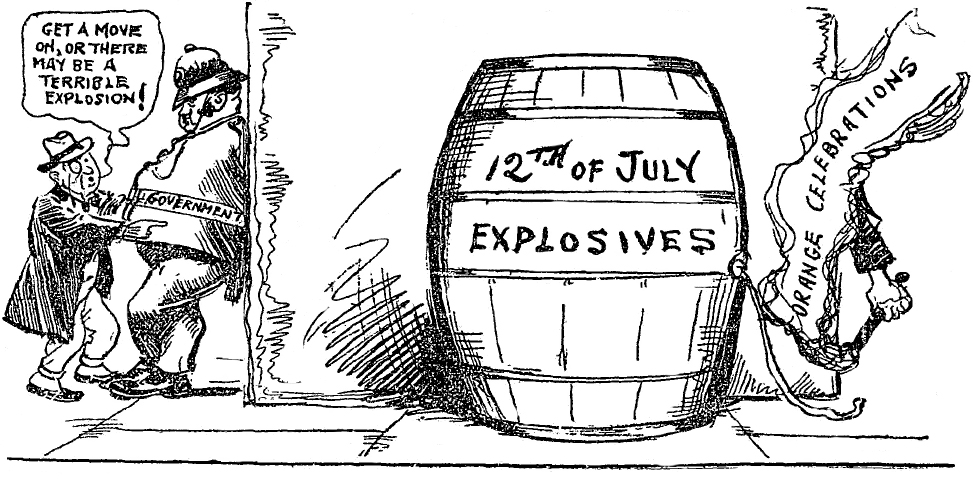Carson threatens return of Ulster Volunteers in militant Twelfth speech
Belfast, 13 July 1920 - Sir Edward Carson has delivered a stark threat to the British government that if they did nothing to protect Ulster from the machinations of Sinn Féin, then unionists would take matters into their own hands. The MP for Belfast Duncairn said that he would reorganise the Ulster Volunteers (UVF) no matter what the consequence, adding pointedly: ‘I hope you have got that pretty clear. I hate words without action.’
Mr Carson was speaking at an Orange demonstration in Finaghy, four miles from Belfast city centre, yesterday, to mark the anniversary of the Battle of the Boyne.
Drizzly weather did not deter large crowds from turning up with marshals estimating that a crowd of 20,000 took part in a procession from Belfast to Finaghy. The procession included the usual Twelfth of July trappings of drums, bands, banners and Orange regalia.
When Carson’s turn came to address the large crowd, he denounced not only the British government, but Sinn Féin, the Catholic Church and the county councils which had chosen to give their allegiance to the Irish republic.
The tenor of Carson’s comments found an echo in other speeches delivered across the province of Ulster yesterday.
William Coote, MP for south Tyrone, addressing a crowd in Fivemiletown, advised unionists not to ‘await the sending of troops or police to Ulster, but to organise secretly to protect themselves.’ He complained that the British government was directing too much attention to other parts of Ireland and that, in the circumstances, Orangemen must use the means they had at their disposal to defend themselves. ‘If the assassin was to strike at peaceful citizens, they, as Orangemen, would hold the priests responsible in the parishes where such crimes occurred.’
James Rolston Lonsdale, MP for mid-Armagh, told a gathering of Orangemen in that county ‘that they were meeting in practically the same circumstances as 230 years before, surrounded by enemies and their country in a state of turmoil. In the south and west, a rebel government had established courts – under judges and authorities not appointed by the British government – but with the help of the Orange institution, Ulster would remain clear of that sort of thing.’
Ulster unionist split
While the Twelfth of July demonstrations have traditionally served
as occasions for underlining loyalist unity, on this occasion they
have
exposed divisions
over
Carson’s support
for a partition plan that leaves unionists in three Ulster
counties at the mercy of a possible Sinn Féin government.
Speaking in Clones, Michael Elliott Knight, Grand Master of the
Orange Order in Monaghan, expressed his disgust at the prospect of
separating Monaghan, Donegal and Cavan from the rest of Ulster and
the desertion of loyalists there by those who they should be able
to call friends.
The Ulster Unionist Council had, Reverend J.C. Taylor told a gathering at Maguiresbridge, Co. Fermanagh, thrown the loyal men of Monaghan, Cavan and Donegal to the wolves to try and save their own skin.
[Editor's note: This is an article from Century Ireland, a fortnightly online newspaper, written from the perspective of a journalist 100 years ago, based on news reports of the time.]





















